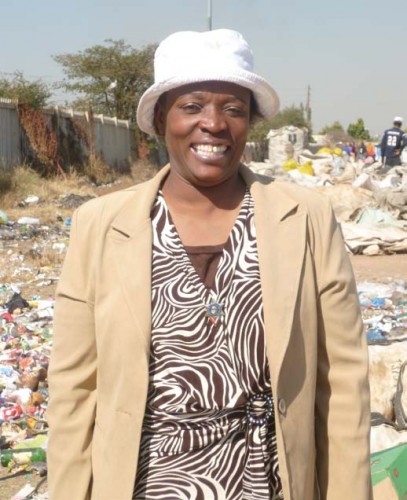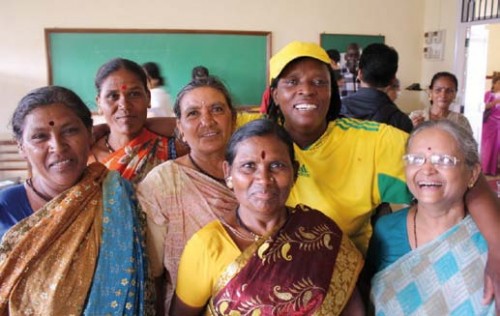by Demetria
November 13, 2011
Mmapula Baloyi is not looking like a waste picker today. She is smartly dressed as she smilingly meets us inside the ‘stop nonsense wall’ that surrounds Temba, the site where she works.
She is a proud reclaimer who enjoys her work, “I have worked here for ten years and I can’t think of working anywhere else. The people are friendly and I think it’s great to clean the environment. I live near here too so I don’t have to travel to work. But I don’t like sorting, my favourite is picking.”
But Mmapula is more than a waste picker. She is a good organizer and she sees the shortcomings in people’s work conditions.
“It’s hard work with a lot of bending and we work with sharp objects and dangerous substances sometimes. A chemical bottle can burst, and pickers get asthma and irritable eyes. You have to bring your own gloves as you can cut your fingers badly.”
She was elected chair of the workers committee because they quickly saw that she cared about them, as she put it, “I would feel ashamed if I didn’t help them.” Her leadership led to the Tshwane Waste Pickers Network nominating her to go to India in June to learn how reclaimers have organized themselves there.
Miracle in Pune
“It was my first time to go on a ‘plane and I was so afraid.’ But her fear vanished when she was drawn into the fascinating world of waste reclaiming in and around Mumbai together with other waste pickers from elsewhere in the world.
Her Indian hosts took the visitors to Pune where they witnessed how waste was segregated. In a collectively run project Mmapula saw the separation of dry and wet waste and how dry waste was converted into compost and sold to people for their gardens.
In Pune they dropped in on Malhem Engineering Company which collects discarded hotel food and converts it into bio gas. Mmapula watched fascinated as the food was squeezed through a machine, the liquid filtered off as fertilizer while the remainder was used to generate bio gas which was captured in a large balloon above the machine.
“I was so surprised that something like cabbage can make gas! Then outside they showed us a cooking stove which was operating off the gas. I saw a miracle, waste ending up as compost and gas. It made me think.”
New Delhi – hope and threat
In New Delhi the Indians told their visitors about their organization Chintan. Chintan invests workers’ savings and pays them out to send their children to school. It also ensures that no children work on landfills.
In New Delhi Mmapula learnt that waste pickers had ten good years of organizing and plentiful work. But now they are being evicted from landfills as companies dig up and incinerate the waste to generate electricity. The incinerators can be manned by five labourers whereas waste picking provides work for many more.
To ensure that waste pickers voices and grievances are heard, collectors’ organizations try to keep in close contact with local and regional politicians. Their collectives encourage politicians to meet with reclaimers and to listen and understand their fears and hopes and assist them where possible. This has been successful in some cases.
In Pune Mmapula also learnt about SWaCH an organization for street collectors who move from house to house collecting packets of waste. The organization helps them sell directly to buyers who want, for example, plastic waste. Through the SWaCH collective workers have managed to buy decent work uniforms.
India inspires
“I liked Indians” comments Mmapula, “I’d like to live there because waste pickers are so organized. It made me think we must raise our voices and build in Tshwane. groundWork (a South African environmental justice NGO) has been helping us organize but we were not listening but now, coming from India, I understand what they were saying is actually true.”
Mmapula has a number of ideas that she would like waste pickers to pursue. She’d like them to build a collective organization and get registered and recognised so they can open a bank account and organize pensions and assistance with their children’s education.
She feels strongly that waste pickers need to meet with the local municipality more often and also with politicians in higher places like the minister of environmental affairs. In this way their contribution, needs and grievances can be recognized.
“Inspiration comes from others. In India I know we have their moral support. But we lack knowledge. We need more workshops and discussion. But without organization we can do nothing. Government will just say who are you and where do you come from.”
Mmapula intends to report back to the Tshwane Network to see what they think about her Indian experience. “But first and most important,’ she emphasizes “we must listen carefully to each other. At meetings everyone talks at the same time and pulls in different directions. We need to learn to listen properly in the way I saw in India.”
Kally Forrest with translator Bongani Xezwi
Photos by Kally Forrest and Lucia Fernandez
Tweet



